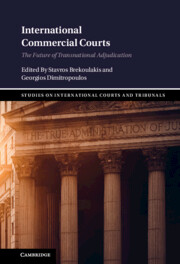Book contents
- International Commercial Courts
- Studies on International Courts and Tribunals
- International Commercial Courts
- Copyright page
- Contents
- Contributors
- Foreword
- Preface
- International Commercial Courts: The Future of Transnational Adjudication – An Introduction
- Part I A Contextual Perspective to International Commercial Courts
- Part II Jurisdiction, Applicable Law and Enforcement of Judgments
- Part III Procedure, Function, Organization
- Part IV The Interplay between International Commercial Courts and Other Dispute Resolution Fora
- 15 The Interplay between International Commercial Courts and Ordinary Courts
- 16 Private Autonomy in International Commercial Dispute Resolution
- 17 Procedure before International Commercial Courts and Ordinary Courts
- Part V International Commercial Courts and Global Governance
- Index
17 - Procedure before International Commercial Courts and Ordinary Courts
A Comparative Perspective
from Part IV - The Interplay between International Commercial Courts and Other Dispute Resolution Fora
Published online by Cambridge University Press: 14 April 2022
- International Commercial Courts
- Studies on International Courts and Tribunals
- International Commercial Courts
- Copyright page
- Contents
- Contributors
- Foreword
- Preface
- International Commercial Courts: The Future of Transnational Adjudication – An Introduction
- Part I A Contextual Perspective to International Commercial Courts
- Part II Jurisdiction, Applicable Law and Enforcement of Judgments
- Part III Procedure, Function, Organization
- Part IV The Interplay between International Commercial Courts and Other Dispute Resolution Fora
- 15 The Interplay between International Commercial Courts and Ordinary Courts
- 16 Private Autonomy in International Commercial Dispute Resolution
- 17 Procedure before International Commercial Courts and Ordinary Courts
- Part V International Commercial Courts and Global Governance
- Index
Summary
Despite divergencies, international commercial courts have in common the claim to be different from the ordinary courts. This chapter examines the differences in procedure between international commercial and ordinary courts by focusing on three distinctive features: namely, the cross-border character of the disputes they handle, the voluntary establishment of their jurisdiction and their arbitration features. It starts by exploring the notion of an international dispute across various international commercial courts and identifies broad internationality criteria. Then, this chapter turns to the voluntary jurisdiction of international commercial courts. It illustrates that in order to attract disputes, international commercial courts had to ease the establishment of their jurisdiction and loosen their jurisdictional requirements. Lastly, it is demonstrated how international commercial courts and their arbitration features attempt to beat the allegedly ‘unbeatable’ virtues of arbitration. In conclusion, this chapter assesses the procedural differences between international commercial and ordinary courts and their potential to enhance the attractiveness of the former over the latter.
Keywords
- Type
- Chapter
- Information
- International Commercial CourtsThe Future of Transnational Adjudication, pp. 421 - 444Publisher: Cambridge University PressPrint publication year: 2022



